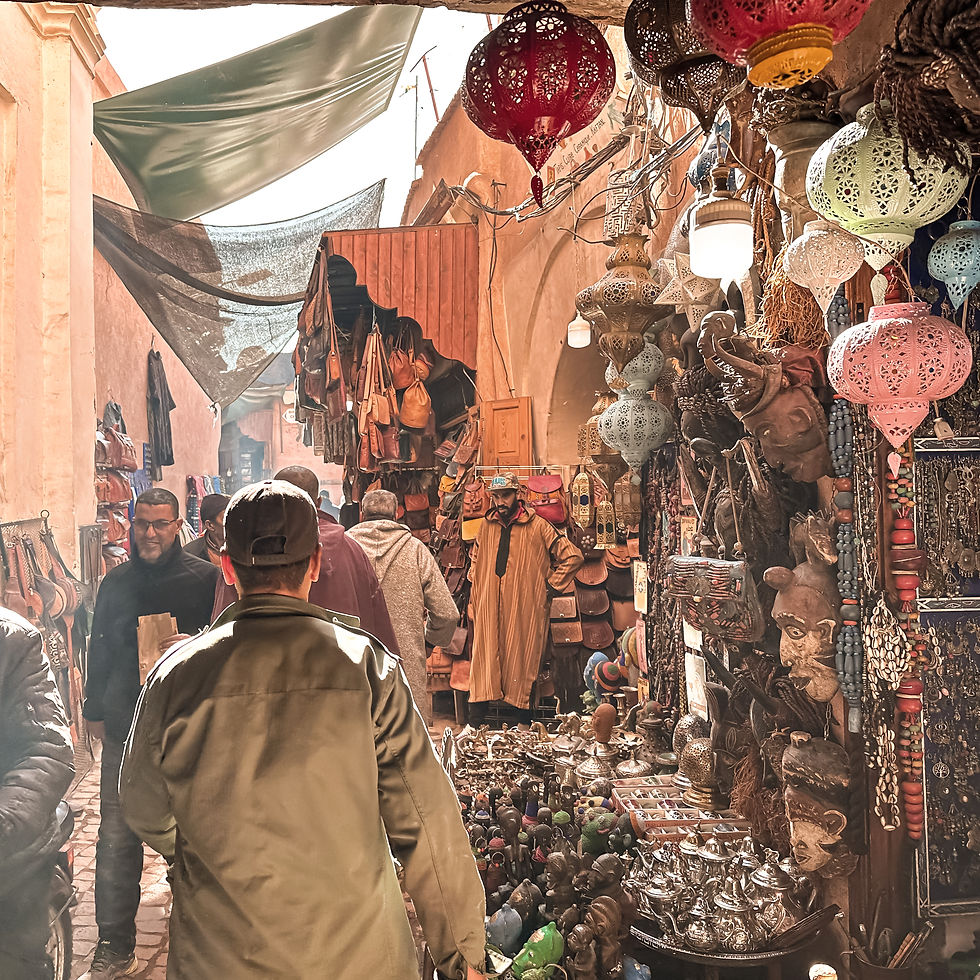Is Morocco Safe to Visit? A Traveler's Guide to Safety and Peace of Mind
- Lindsey

- Dec 8, 2024
- 4 min read
Is Morocco Safe to visit? The short answer is Yes.—Morocco is considered one of the safest countries in Africa to visit. Morocco has a low crime rate, and has a reputation for for being peaceful, especially in major tourist hubs like Marrakech, Fes, and Essaouira. Morocco is also a tourist-friendly country. Locals often go out of their way to make visitors feel welcome. Moroccan's government also has implemented measures to enhance tourist safety.
While it’s generally safe for travelers, it’s important to follow basic travel precautions, much like you would in any European destination. That's why we have provided 5 of our essential safety tips that can help keep you safe and secure while visiting the vibrant country of Morocco.
Keep your valuables safe.
As with many bustling cities around the world, pickpocketing is one of the most common risks for tourists in Morocco. To stay safe, always keep your cash and passport secure, ideally in a travel pouch or money belt worn close to your body. Avoid storing these valuables in easily accessible pockets, backpacks, or handbags, as they can be easy targets for pickpockets in crowded areas.
Our preferred method for carrying important belongings throughout your Moroccan journey is a crossbody bag. This type of bag rests close to your body, can be worn across the front for added security, and is convenient to wear in any setting without the need to remove it. This minimizes the risk of misplacing it or forgetting it behind while still keeping your items safe and within easy reach.
Regardless of the type of bag you choose, make sure it has secure zippered pockets. This extra layer of protection can help prevent theft and give you greater peace of mind as you explore Morocco.
(Our favorite way to carry our belongings while exploring busier cities in Morocco is this Cotopaxi hip pack. It can be worn during any part of your trip, easily, and comfortably. The zippered pockets keep belongings safe and secure).

Be Mindful of Traffic.
Be extra mindful of traffic, especially in Morocco’s bustling cities like Marrakech and Fes! The streets can feel like a whirlwind of energy, with cars, scooters, bicycles, and pedestrians all moving at once. Many areas don’t have clear pedestrian crossings, and drivers might not always give way to you. Take your time—patience is key! Wait for a safe moment to cross, or better yet, cross with your guide to stay extra secure. When you do cross, make sure to assess the traffic from all directions, as scooters and bicycles often zip through unpredictably. In more crowded spots, stick to designated crosswalks if available, but always stay alert, make eye contact with drivers, and ensure they see you before stepping into the street. It’s all part of the vibrant Moroccan experience.

When you visit the Medinas, get ready for an exciting, fast-paced experience! Keep your ears open for shouts of "Balak!"—a lively warning that something is zipping your way! Motorcycles, bicycles, and carts are constantly zooming through the narrow streets, and you might think they’ll yield to pedestrians, but that’s not the case in the medina. Here, it’s the pedestrians who need to yield to the traffic! Stay alert, keep your wits about you, and get ready to jump aside as you navigate the hustle and bustle of these vibrant, action-packed markets!
Be Aware of Unsolicited Help.

While most of the locals in Morocco are genuinely kinds and helpful, some may have hidden motives, such as leading you to a shop where they get a commission or trying to charge you for a service you didn’t ask for. If someone approaches you offering help, politely decline if you're not in need. Trust your instincts and always stick to pre-arranged plans or seek assistance from official sources like your guide or hotel staff. Be sure to pre-arrange pricing before you agree to make a purchase, and never accept unrequested rides or tours. We recommend using your gps to get around the busy areas, rather than asking strangers for directions.
Dress Modestly.

To avoid unwanted attention in Morocco, dressing modestly is key—loose-fitting clothing that covers your shoulders and knees will help reduce unwanted attention. Staying confident and assertive is important; walk with purpose and avoid engaging with those who try to make you uncomfortable. Traveling in groups can provide added security, and sticking to busy, well-lit areas, especially at night, reduces the chances of encountering unwanted attention. Hiring a local guide not only enriches your experience but also offers extra protection. If harassment occurs, it's often best to ignore the person and keep walking, but if you feel unsafe, seek refuge in a shop or café.
Be Aware of Scams.
In Morocco, there are several common scams that tourists should be aware of. Taxi drivers may try to overcharge by either claiming their meters aren't working or taking longer routes, so it's always best to agree on a fare upfront. Unofficial guides often approach tourists offering "free" help, only to demand hefty fees afterward, so it's safer to book tours through reputable sources. Be cautious of henna artists who offer free tattoos, only to ask for large sums of money afterward—always set a price first. Similarly, some overly friendly locals may strike up a conversation with the intention of leading you to specific shops or restaurants where they earn a commission. In markets, vendors might quote inflated prices, but bargaining is expected, so don’t be afraid to negotiate. Additionally, some shopkeepers may try to redirect you to more expensive items or services once you've committed to a purchase. By staying alert and using common sense, you can avoid falling victim to these scams and enjoy your Moroccan adventure with confidence.





Comments